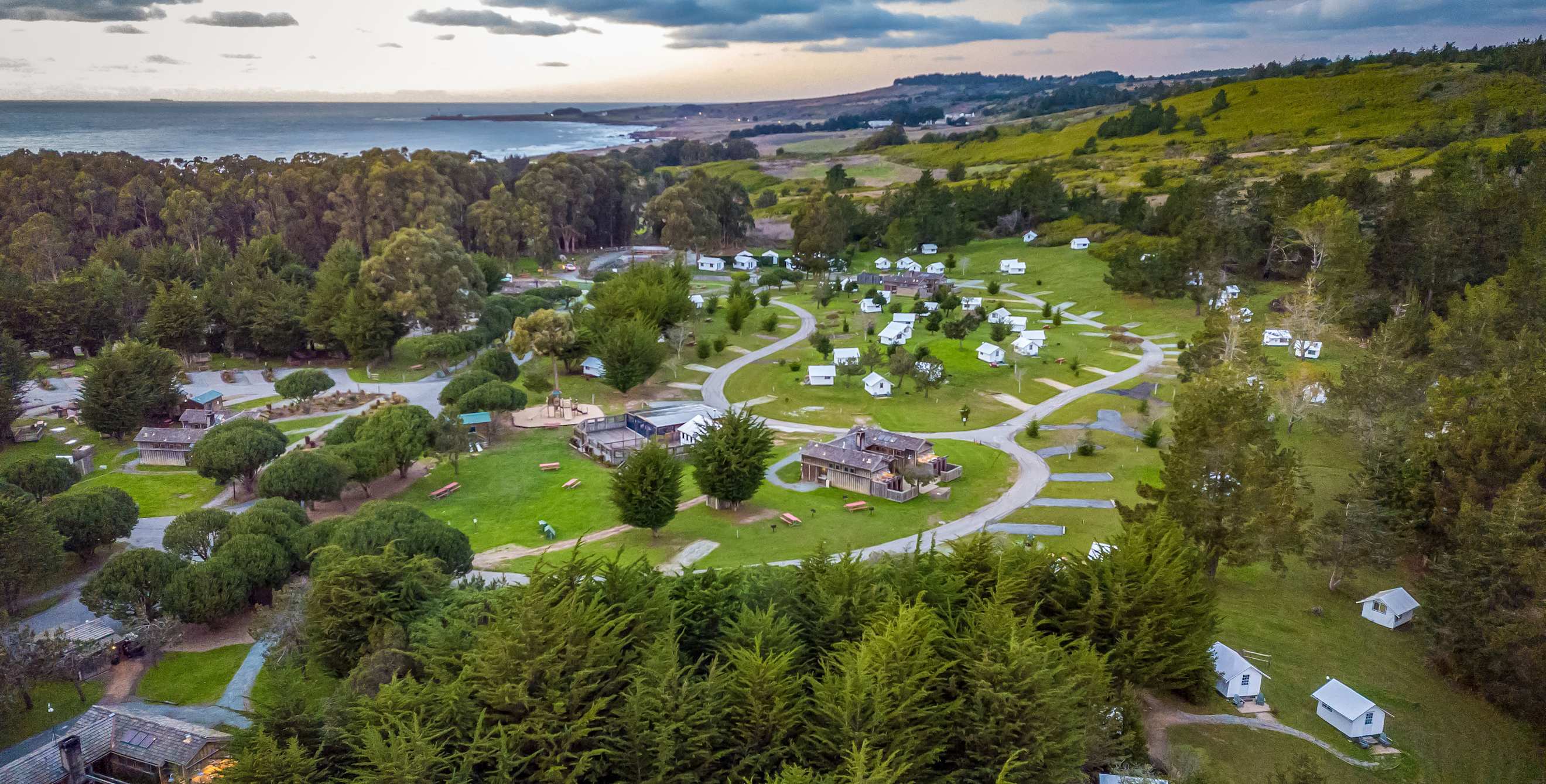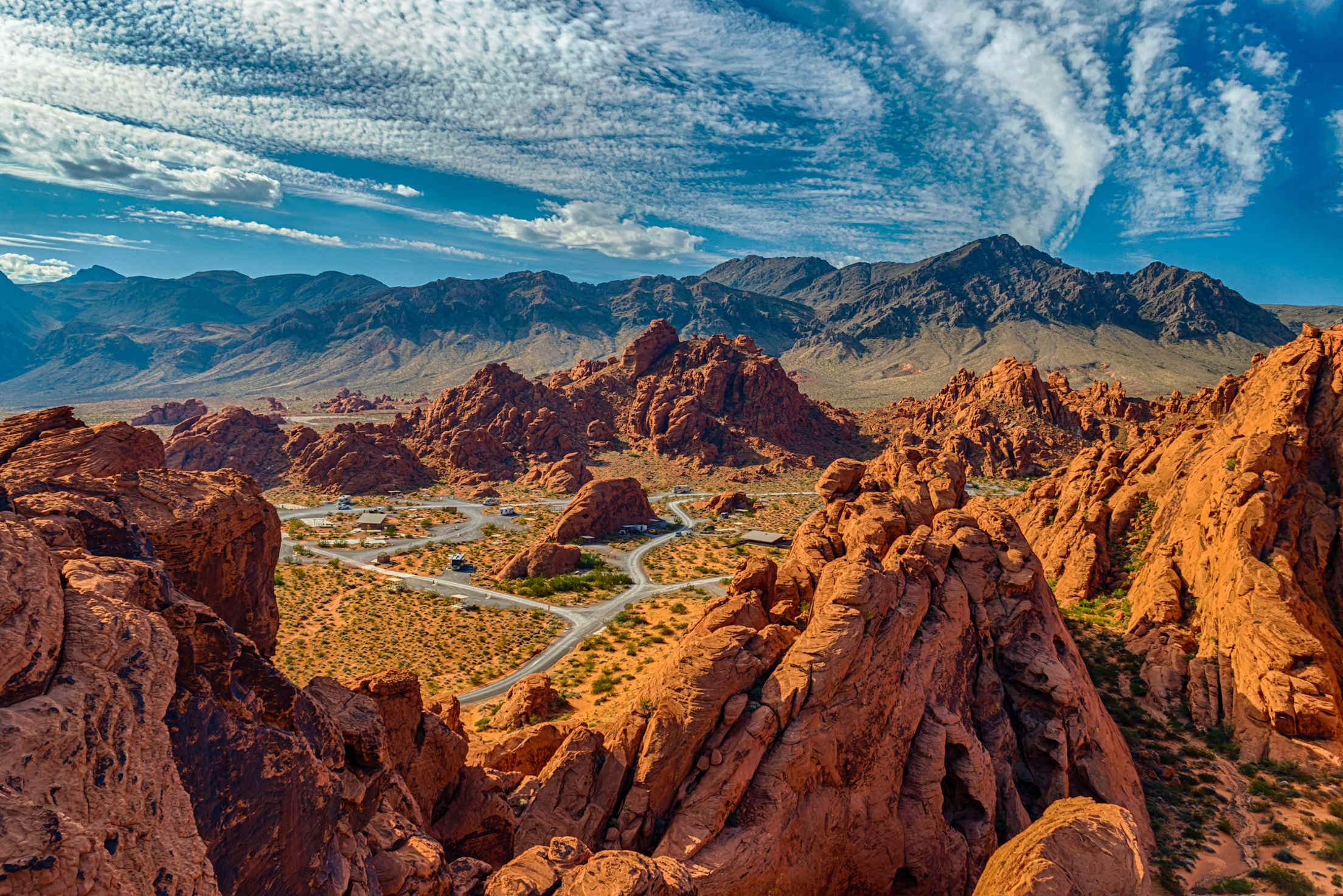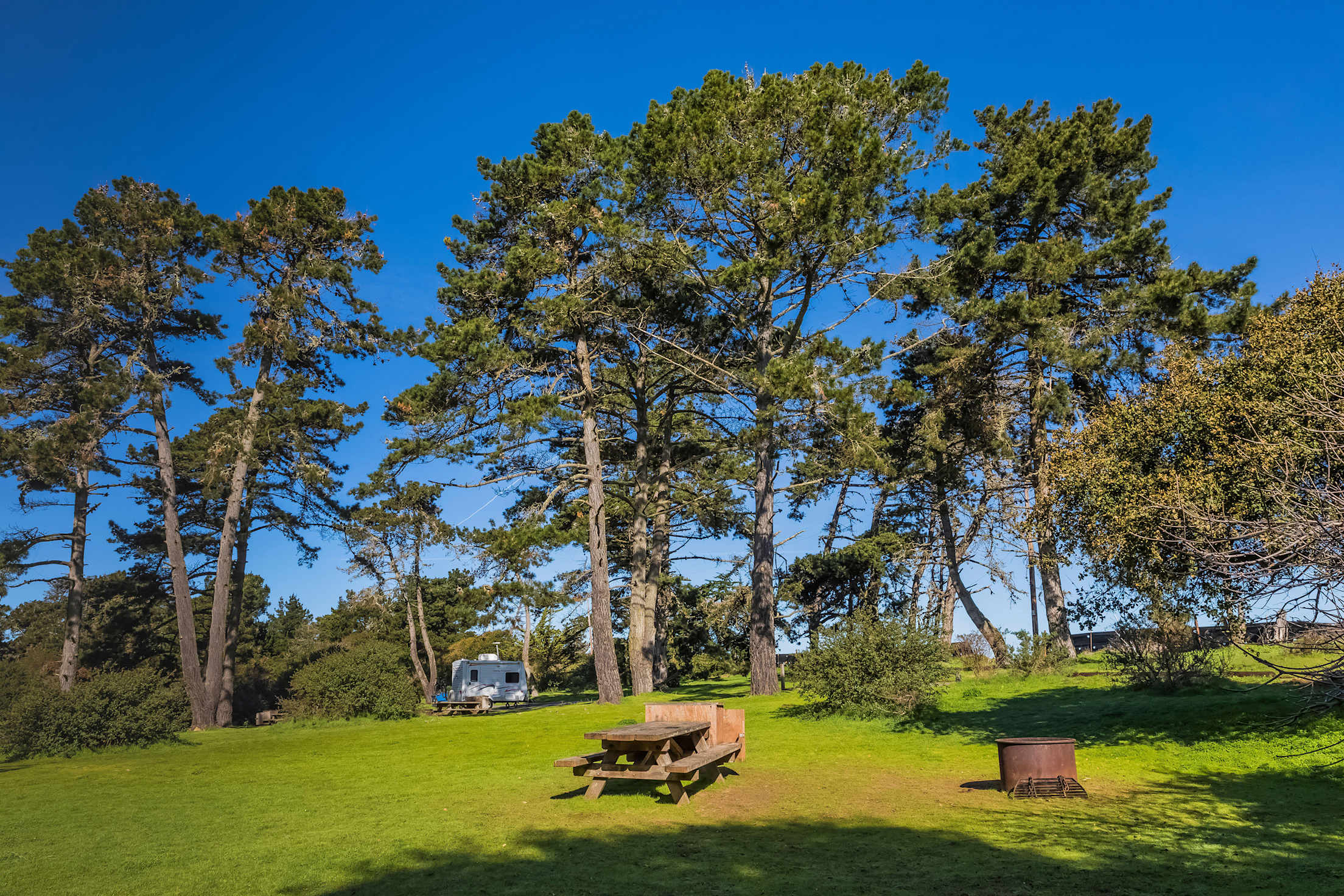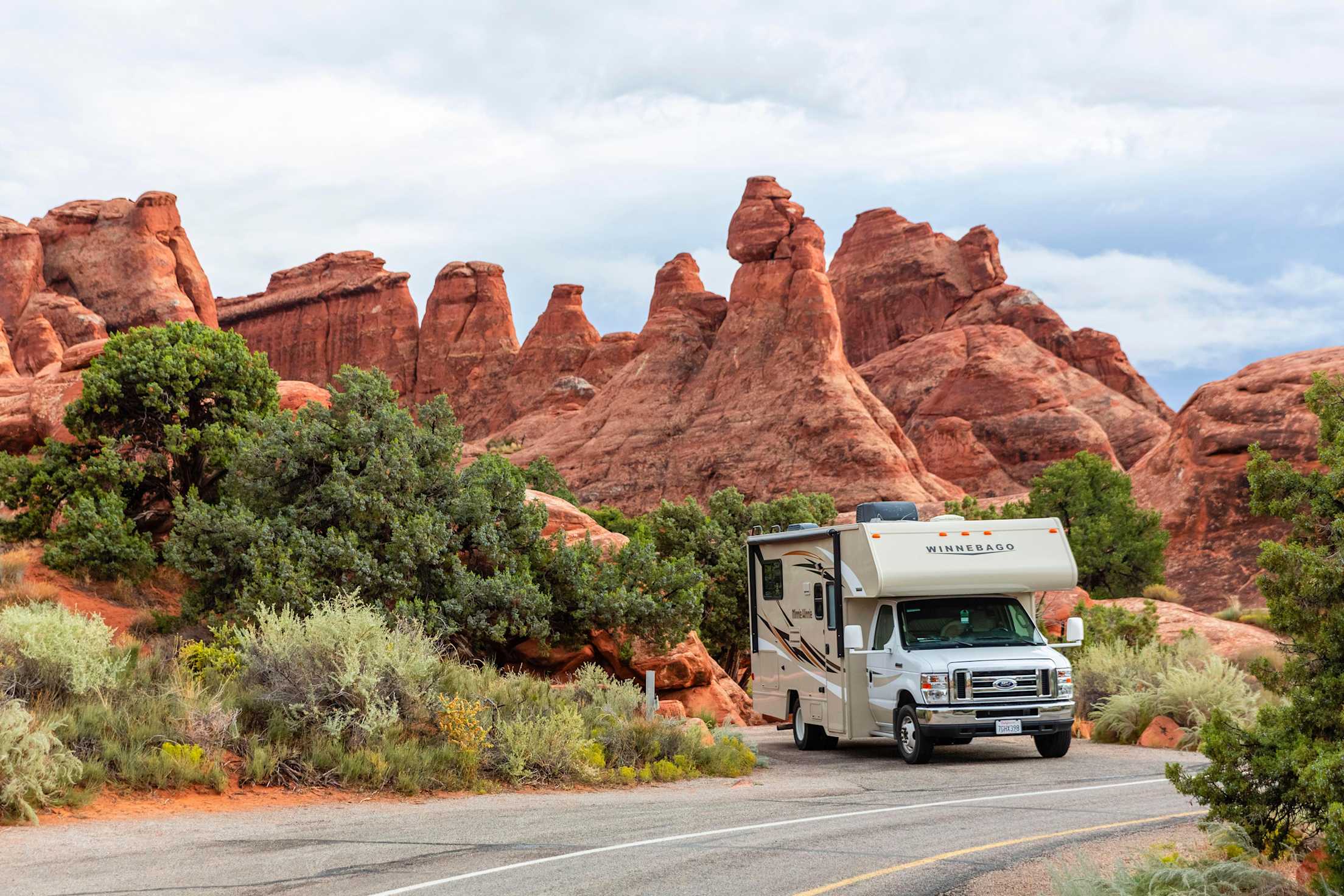
7 Best Spots to Camp This Winter in the West
Find quiet respite and mild conditions at these campgrounds.

With fewer crowds, clearer skies, and greater chances for wildlife sightings, winter can be the perfect time for camping. That is, as long as you know where to look. Here are seven of the best campgrounds in the West, from the California coast to southern Montana, for spending a few nights under the stars without extreme weather.
Costanoa KOA Campground in Pescadero, California
A year-round eco-adventure resort perched along the California coast, 24 miles north of Santa Cruz, Costanoa is home to everything from locally sourced eateries to spa services. Its KOA campground also has 88 RV campsites and 16 tent sites. Campers here have access to Costanoa’s comfort areas, which along with restrooms and showers feature their own dry sauna and outdoor fireplaces. Then there are the 30,000 acres of surrounding state parks, including Año Nuevo State Reserve—which offers docent-guided walks through March to view its resident elephant seals. Opportunities for hiking, biking, and kayaking abound. Activities such as tie-dye workshops and seasonal sunset s’more roasts take place on site throughout the season, and the resort also offers plenty of canvas-walled, tent-style bungalows, if glamping is more your thing.
Coast Campground in Point Reyes National Seashore, California
An expanse of wooded hillsides, windswept beaches, and dairy farms make up this pristine natural sanctuary, which also happens to be home to a backcountry campground that’s ideal for winter revelers. Point Reyes’s Coast Campground is just a two-mile hike (it’s also accessible by bike or on horseback) inland via the preserve’s Laguna Trail. Set in a grassy coastal valley, the camp is an easy walk to a good stretch of sandy beach, as well as tide pools filled with black turban snails, periwinkle, and brightly colored sea stars. There are 14 sites in total—12 individual and two group sites—with a basic latrine and potable water nearby. Sites one through seven are the most private of the bunch.
Mild temps and clear skies make Point Reyes a great place for watching gray whales migrate south, through January. It also means less crowds for enjoying the preserve’s picturesque scenery. Reserve your site at Recreation.gov.

Valley of Fire State Park in Clark County, Nevada
Just 46 miles northeast of Las Vegas, Valley of Fire State Park is seemingly otherworldly. Its 42,000 acres of towering cliffs, slot canyons, and red Aztec sandstone rock formations are best enjoyed outside of summer, when the Mojave Desert’s stifling heat is often unbearable. Winter temperatures are more welcoming, though they can dip down to freezing once the sun falls, so layer up! Camping here is split between two year-round campgrounds: Atlatl Rock Campground, which has 43 sites, and Arch Rock Campground, with 29 sites. Each of them are set among the park’s colorful rock structures, and showers, restrooms, and potable water are available at both.
Along with ample hiking, the park is home to an onsite visitor center that highlights local wildlife and plant life and the geology of the rock formations, as well as ancient petrified trees and petroglyphs dating back thousands of years. Book ahead at ReserveNevada.com.
Klamath Falls KOA Journey in Klamath Falls, Oregon
This gem of a campground sits just 25 miles or so north of the California/Oregon state border, and it is an ideal base for exploring both Crater Lake National Park and Klamath Basin, where as many as 1,000 eagles winter throughout January and February. It’s also an easy walk to the OC and E Woods Line State Trail, a 100-mile hiking and biking trail created along an old railbed. The pet-friendly campground has seven large and grassy tent-only sites, each equipped with their own fire ring and overlooking a creek. There are also 43 RV sites, three cabins, laundry facilities, and a KOA store stocked with snacks and camping essentials (including firewood) on site.

Sunset State Beach Campground in Santa Cruz County, California
Located at the southern end of Santa Cruz County, Sunset State Beach Campground is the perfect family-friendly base for viewing monarch butterflies before they migrate back to Mexico. Look for them through January at nearby Moran Lake Park (a 15-mile distance) or Natural Bridges State Marine Reserve, a bit further afield. Winter is also a wonderful time for spotting migrating gray whales from the state beach’s miles of unobstructed coastline.
With a total of 85 tent and RV sites, the campground itself sits near a pine- and oak-forested bluff overlooking Sunset State Beach, and it is divided into three main loops: Dunes Camp, Pine Hollow Camp, and South Camp. Each of them is equipped with restrooms and pay showers. Secure your spot at ReserveCalifornia.com.

Devils Garden Campground in Arches National Park, Utah
Brimming with more than 2,500 nature-sculpted arches, not to mention pinnacles, rock bridges, and a wealth of other stunning geologic formations, Arches National Park is a sight to behold. It’s also little wonder that the park’s only campground fills up quickly. Winter weekdays tend to be your best bet for scoring a site, with 25 of them available first-come first-served between November and February. Firewood is available for purchase at the park’s visitor center bookstore, though the nearest place to secure food, gas, and other essentials is in Moab, 23 miles south of the campground. Days are ideal for hiking, while winter’s long nights are superb for enjoying the celestial wonders of this International Dark Sky Park. Southeast Utah’s high desert brings cool temperatures (it can get as low as 0° at night) so bundle up and bring the appropriate gear!
Eagle Creek Campground in Gardiner, Montana
Winter is an excellent time for enjoying the wonders of Yellowstone National Park, especially in Lamar Valley, where wildlife such as wolves and bison are especially easy to spot against an often-snowy landscape. A night at Eagle Creek Campground will get you into the park bright and early. It’s located within Custer Gallatin National Forest, just two miles from Yellowstone National Park’s north entrance, and features 20 RV and tent sites. From an elevation of 6,100 feet, these creekside spaces offer fabulous views across Yellowstone’s Mammoth Hot Springs valley. With basic amenities like vault toilets, bear boxes, and fire rings, the first-come, first-served campground (reservation-only May-October) is also a great alternative to Yellowstone’s Mammoth Campground, which has been closed since June 2022 due to flood damage.